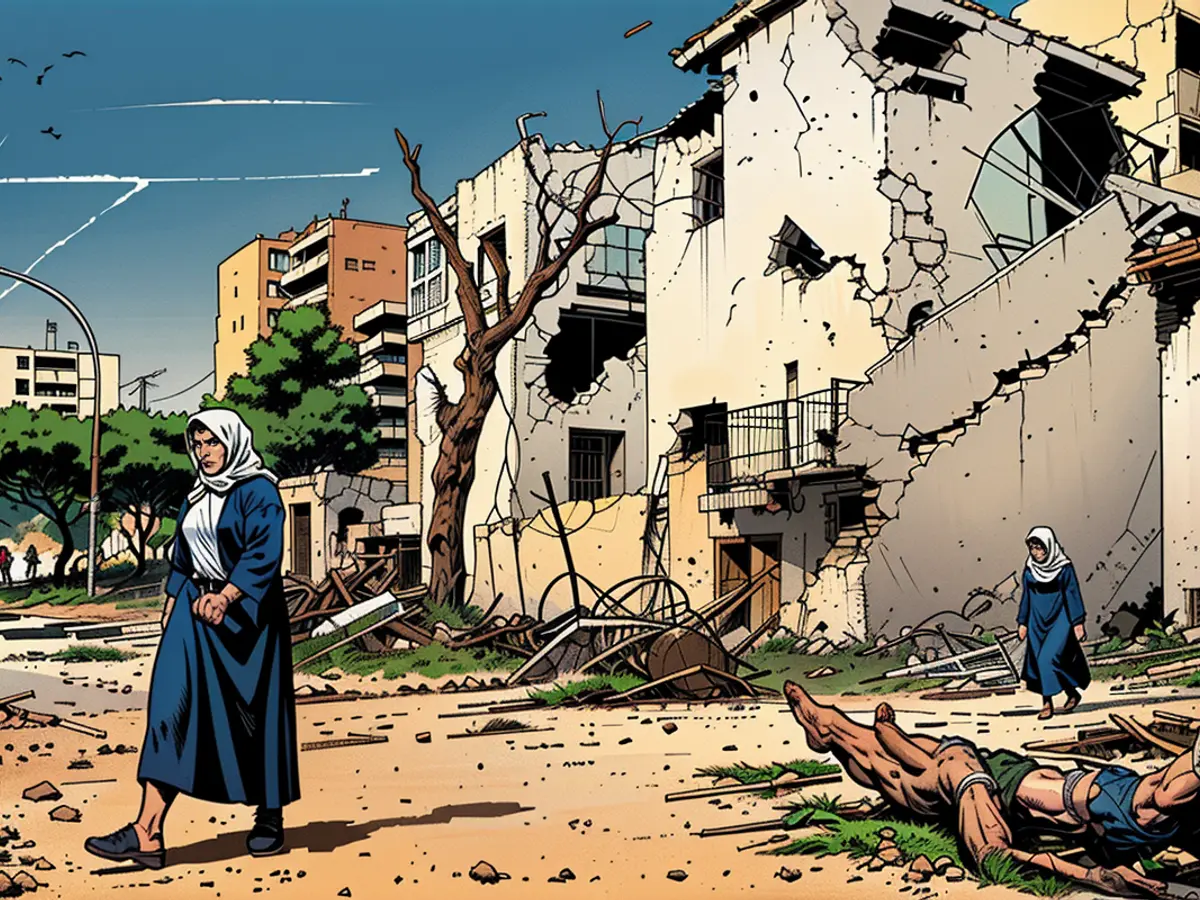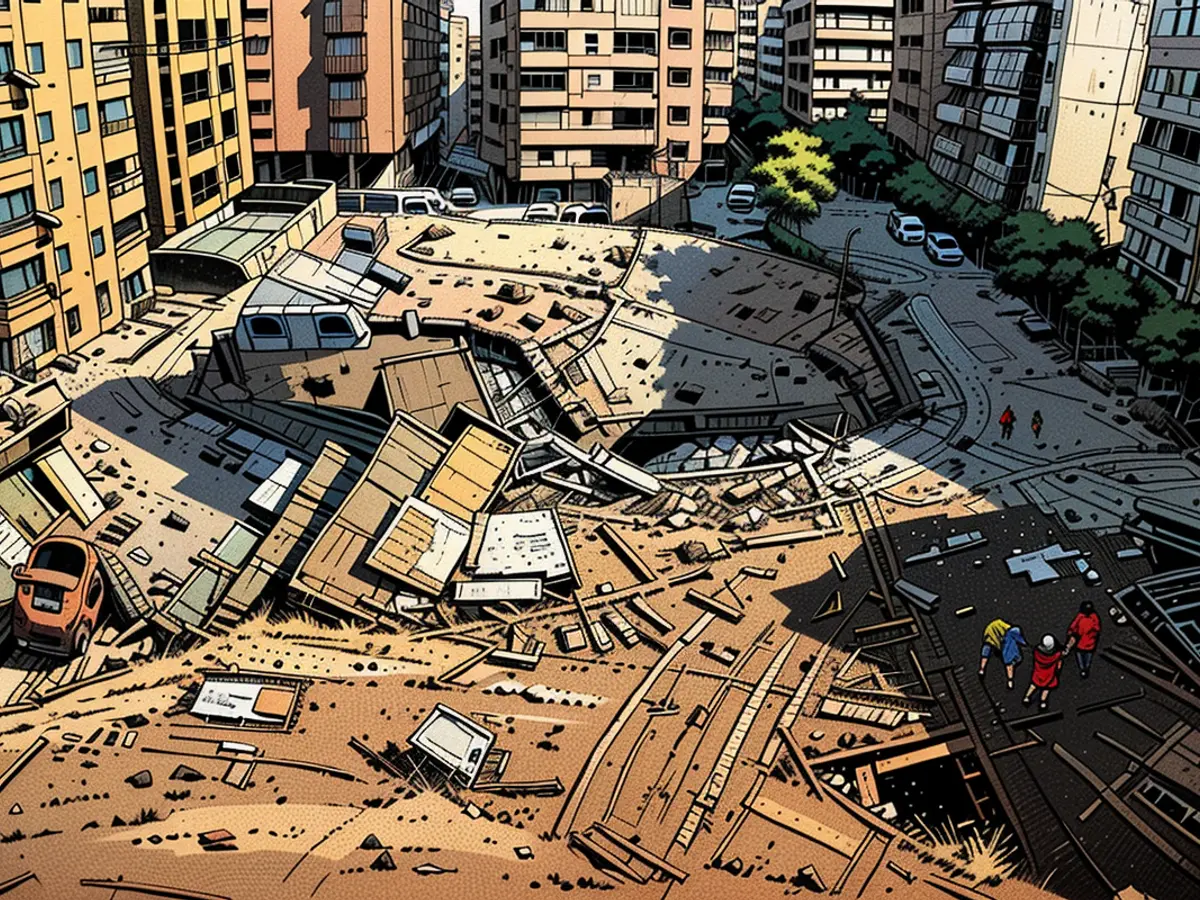Israel seeks to shift the power dynamics in the Middle East. Historical precedents offer a cautionary tale.
Israel's head honcho sees an opportunity arising for a significant power shift in the Middle East, believing Hezbollah to be on its last legs. However, an all-out victory remains elusive, as history has shown that what is often desired can lead to regret.
Since September 17, Israel has been dealing Hezbollah, the Iran-backed militant group, one incapacitating blow after another in Lebanon. The series of attacks began with the detonation of pagers and walkie-talkies, followed by a sizable air strike in southern Beirut that claimed the life of senior commander Ibrahim Aqil along with around two dozen civilians. Three days later, a fierce bombing campaign commenced, culminating in the bombing that virtually obliterated multiple buildings and claimed the life of Hezbollah's senior leadership, including Nasrallah.
Yet, history provides neither sweet nor pleasant lessons for leaders who aspire for profound modifications in Lebanon, let alone in the Middle East as a whole.
On June 6, 1982, Israel invaded Lebanon with the intention of crushing the Palestinian Liberation Organization and establishing a malleable Christian-dominated government in Beirut, while also driving out Syrian forces. Regrettably, Israel fell short in all three objectives. Although Palestinian armed groups were compelled to leave Lebanon under a US-brokered deal, Palestinian aspirations and the PLO survived. In 1987, Gaza and the West Bank erupted in a fervent uprising, spreading Palestinians' rejection of Israeli occupation to unprecedented levels.
Israel's primary Lebanese ally during the invasion was Bashir Al-Gemayel, a Maronite Christian militia leader who was, unfortunately, assassinated before he could take office. His brother, Amin, succeeded him, and under his leadership and the US' support, Lebanon and Israel signed an agreement in May 1983 for the establishment of amicable bilateral relations. However, in the face of opposition, the government fell the following February, and the agreement was abolished shortly after that.
The US, which had deployed troops to Beirut following the September 1982 Sabra-Shatila massacres, withdrew after its embassy was bombed twice, in addition to the US marines and French army barracks in October 1983.
The Lebanese civil war continued and worsened for more than six years.
Syrian forces, which had entered Lebanon in 1976 under the Arab League's mandate to serve as a deterrent, didn't leave until 2005 following the assassination of former Prime Minister Rafiq Al-Hariri.

One of the most significant effects of the 1982 Israeli invasion in Lebanon was the birth of Hezbollah, which went on to lead the charge against Israel in a relentless guerrilla war that ultimately forced Israel to concede and withdraw from south Lebanon – a significant first and only instance of an Arab military force pressing Israel to vacate Arab territory. Hezbollah, with the help of Iran, proved to be far more lethal and efficient than the Palestinian militants Israel had successfully dislodged.
Hezbollah fought Israel to a standstill in the 2006 war and gained strength with continued Iranian assistance. Today, although crippled and disorganized, and allegedly heavily infiltrated by Israeli intelligence, Hezbollah's end is not yet written.
Beyond Lebanon and Israel, there is the example of the 2003 US-led invasion of Iraq, serving as a stark reminder of the consequences of excessive ambition. As the Iraqi army crumbled and US troops advanced towards Baghdad, the George W. Bush administration harbored hopes that the fall of Saddam Hussein would set in motion the collapse of regimes in Tehran and Damascus, igniting a wave of liberal democracies across the region.
Indeed, the United States' invasion of Iraq descended into the chaos of intense sectarian violence, with the US paying a heavy price in blood and treasure, and the Iraqi people suffering even more. The execution of Saddam Hussein allowed Iran to expand its influence to the very core of the political establishment in Baghdad. Al-Qaeda, dealt a severe blow by the US-led invasion of Afghanistan, was reborn in Iraq's Sunni Triangle, ultimately evolving into the Islamic State in Syria and Iraq.
As I pen these words, I witness smoke rising from Beirut's battered southern suburbs and recollect the words of then-US Secretary of State Condoleezza Rice, who, during the 2006 Israel-Hezbollah conflict, said that all the bloodshed and destruction we were witnessing were "the birth pangs of the new Middle East."
Be wary of those who promise a new dawn, a birth of a new Middle East, or a shift in the balance of power in the region. Lebanon serves as a reminder of the unintended consequences that can arise. It is a place of lessons lurking in the shadows.
The Middle East and the world have witnessed numerous attempts at significant power shifts, with Israel's current campaign against Hezbollah being the latest attempt in the region.
Despite Israel's successes, history shows that ambitious modifications in the Middle East often lead to unintended consequences, as demonstrated in the aftermath of the 1982 Israeli invasion in Lebanon.








